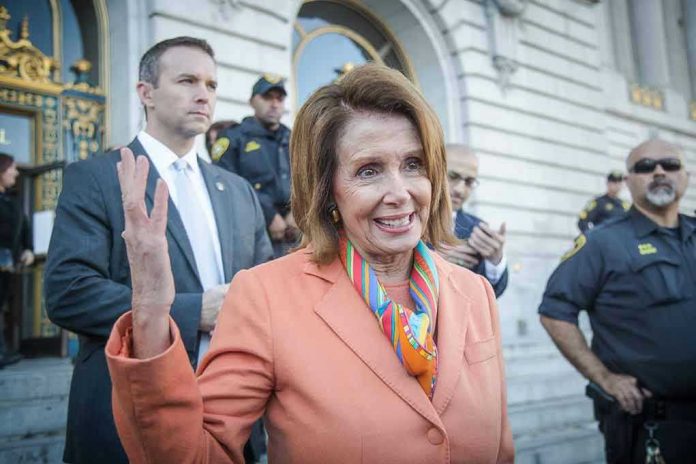
San Francisco’s fate now hangs on who steps into Nancy Pelosi’s shoes—because the next chapter could be more chaotic, more radical, and more consequential than anyone expects.
Story Snapshot
- Nancy Pelosi confirms she will not seek reelection in 2026, ending decades of divisive leadership.
- The race to replace her in California’s 11th Congressional District ignites fierce speculation and anxiety.
- Potential successors may push policies even more extreme than Pelosi’s, risking deeper local and national turmoil.
- San Francisco’s economic woes and public safety crisis intensify the stakes of this political transition.
Pelosi’s Retirement: End of an Era, Start of a Storm
October 2025 brought confirmation from Nancy Pelosi—she will retire at the end of her term, closing the book on her storied yet polarizing tenure as San Francisco’s congressional representative. Pelosi’s career spanned four decades, marked by historic milestones and controversies. Her leadership style, defined by sharp partisan divides and dramatic moments like her public clash with President Trump, cemented her as a lightning rod for national debate. Now, her exit leaves a power vacuum in one of the most hotly contested districts in the country, with party insiders, donors, and activists scrambling to shape the future.
San Francisco, once the crown jewel of the West Coast, has seen its fortunes fade during Pelosi’s stewardship. Critics point to a growing crisis: surging homelessness, rampant crime, and a steady business exodus. The city’s woes have become a rallying cry for those who argue Pelosi’s policies exacerbated decline instead of reversing it. Local reporting highlights the economic downturn, demographic shifts, and public frustration that now define the city. For many residents, Pelosi’s legacy is intertwined with San Francisco’s struggles—casting a long shadow over the upcoming fight for her seat.
The Successor Problem: Radicalization or Renewal?
The contest to succeed Pelosi is already a battlefield. The 11th District remains a Democratic stronghold, but the party is fractured by competing visions. Progressive activists and establishment insiders jockey for position, each group eager to steer the city’s—and the party’s—future. Observers warn that the next representative could be even more radical than Pelosi, with policy agendas likely to drive further polarization. This possibility fuels concern among business leaders, moderate Democrats, and national strategists wary of the district becoming an emblem of extremism. The outcome will shape not just local governance but also the national Democratic narrative.
Pelosi’s influence remains strong, even in retirement. Her endorsement is expected to carry significant weight in the nomination process, potentially tipping the scales in favor of a candidate aligned with her priorities. However, the risk is real: a more radical successor could accelerate the policies that critics blame for San Francisco’s decline. The city’s voters, acutely aware of their daily challenges, must now choose between continuity and change—between pragmatic solutions and ideological crusades.
Democratic Party at the Crossroads: Infighting and Image Risk
Party insiders view this transition as a critical test of unity and direction. The race to replace Pelosi reveals deep fissures between progressive and moderate factions. Internal divisions threaten to spill into public view, risking electoral setbacks and reputational damage. The California Democratic Party, tasked with managing this high-stakes transition, faces pressure to present a united front while balancing diverse and sometimes conflicting interests.
West Coast, Messed Coast™ — Nancy Bows Out, But Meet the Even Worse Guy Who Could Replace Her https://t.co/MK6zkl47bo
— Victoria Taft, The Adult in the Room, FITF Squad (@VictoriaTaft) November 7, 2025
The national implications loom large. Pelosi’s seat has long been a linchpin for House control and a symbol of Democratic strength. Losing ground to infighting or extremism could reverberate far beyond San Francisco, affecting party strategy and morale. Analysts warn that the party’s handling of this succession will signal its broader ability to navigate generational change and policy debates. The stakes are not just local—they are existential for a party grappling with its identity and future.
San Francisco’s Uncertain Future: Economic, Social, and Political Fallout
The impact of Pelosi’s departure and the ensuing political scramble will be felt most acutely on the streets of San Francisco. Residents face immediate uncertainty over leadership and policy direction. The prospect of a more radical representative sparks anxiety among businesses already considering relocation, while citizens demand effective action on homelessness and public safety. The tech and retail sectors, vital to the city’s economy, watch nervously, aware that local politics can shape their fortunes.
Long-term consequences could include deepening social polarization and further economic decline if radical policies proceed unchecked. Nationally, the district’s representation may become a flashpoint in debates over Democratic extremism and urban governance. Experts argue that pragmatic leadership is desperately needed to address San Francisco’s challenges, yet the political climate favors ideological posturing over practical solutions. The next chapter, for better or worse, will be written by those who seize this moment of upheaval.



